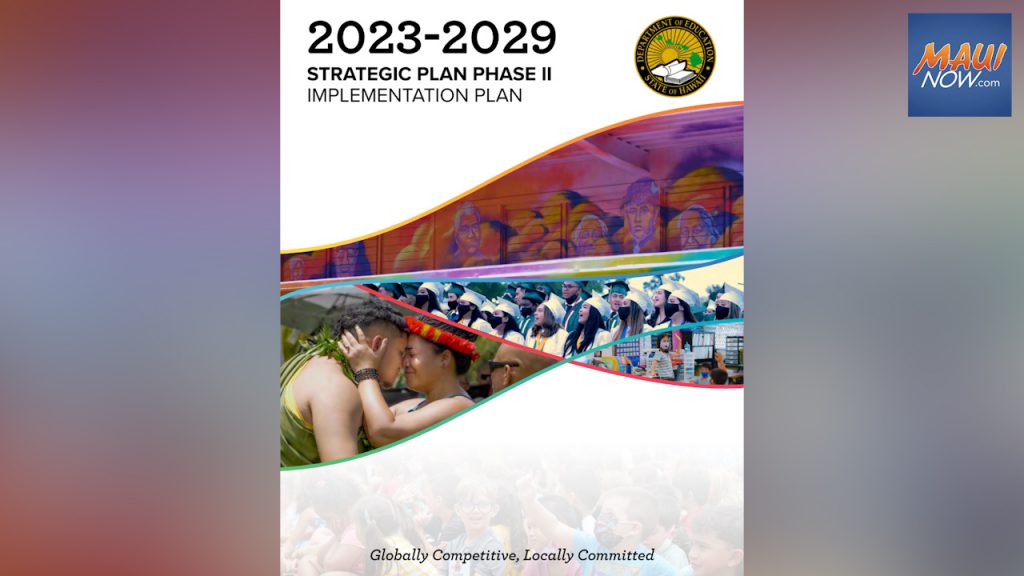HIDOE’s six-year plan to implement new approaches to accelerate student learning

The Hawai‘i State Department of Education will launch and expand initiatives over the next six years to advance public education and student and staff success under an implementation plan approved Thursday by the State of Hawai‘i Board of Education.
“The approval of the implementation plan sets us on a reference course line for how we are going to sail to the destination set by the Board’s strategic plan,” said Board of Education Vice Chairperson Kaimana Barcarse in a department news release update. “While we can still make course adjustments along the way, we can now raise our sails and move forward for the success of our students and communities.”
The Department’s implementation plan aims to build on the momentum of our public schools’ return to learning during the COVID-19 pandemic and to implement new approaches to accelerate student learning and achievement.
“This plan reflects our collective commitment to academic excellence and equity and charts a clear and ambitious path forward for public education in Hawai‘i,” Superintendent Keith Hayashi said in the release. “Through a comprehensive and collaborative process, we’ve identified key actions and initiatives to ensure we are preparing all graduates to be globally competitive and locally committed. I want to acknowledge everyone who contributed to the development of the implementation plan, including the Board and our Department leadership, educators, staff, parents and community partners. Let’s continue working together — ne‘epapa – to make it a reality.”
The implementation plan represents the second phase of the Board’s strategic planning process. The Board completed Phase I of the 2023-29 strategic plan in February, with the adoption of a new mission, vision and core values, and new goals and desired outcomes organized under three overarching priorities for the state’s K-12 public education system.
Phase II, an implementation plan for the Board’s strategic plan, includes the action items and metrics that will be used to achieve the Board-approved goals and measure progress. In developing its plan, the Department analyzed student data, reviewed performance data, engaged stakeholders and reviewed educational research and evidence-based practices.
The implementation plan includes:
- 127 action items for the Board’s 27 desired outcomes,
- 50 performance measures for the action items, and
- 8 statewide key performance indicators.
Some of the action items in the implementation plan include:
- Early learning supports: Partner with government agencies to increase the number of public prekindergarten classrooms on school campuses. Assess all entering kindergarteners using a new, common kindergarten entry assessment tool to inform teachers and schools about support for kindergarteners.
- Middle school supports: Establish 24/7 access to online tutoring for eighth-grade students to provide additional support. Advocate to expand extra and co-curricular activities to engage middle school students.
- Post-high school success/workforce: Collaborate with colleges and industry partners to support high school graduates’ transition to postsecondary education and training after high school, including streamlined admission to the University of Hawai‘i and attainment of immediate employment, including accelerated placement in apprenticeships and workforce training.
- Support for vulnerable populations: Hire liaisons to facilitate communication between Pacific Islander students, families and schools to build a cultural understanding among school staff and students. Collaborate with community organizations to train and support Department staff in cultural awareness, competence and humility for diverse communities.
In the upcoming 2023-24 school year, the Department will propose targets for the key performance indicators over the plan’s six years. Given the unprecedented disruption of COVID-19, the Department will consider this year’s student learning data in proposing statewide KPI targets.
The Department will report to the Board and the public on progress on the strategic plan and on execution of the implementation plan. The reports will be an important opportunity to communicate about key actions, plans, progress, successes and challenges, and will include quantitative and qualitative information, including interim progress measures on key performance indicators, where applicable, and measures of desired outcomes.
Also at Thursday’s meeting, the Board rated Superintendent Hayashi’s performance for the 2022-23 school year as effective overall, taking into consideration his performance in priority areas spanning strategic planning, communication with Board members, professional growth, and communications with families and news media.
Resources:









